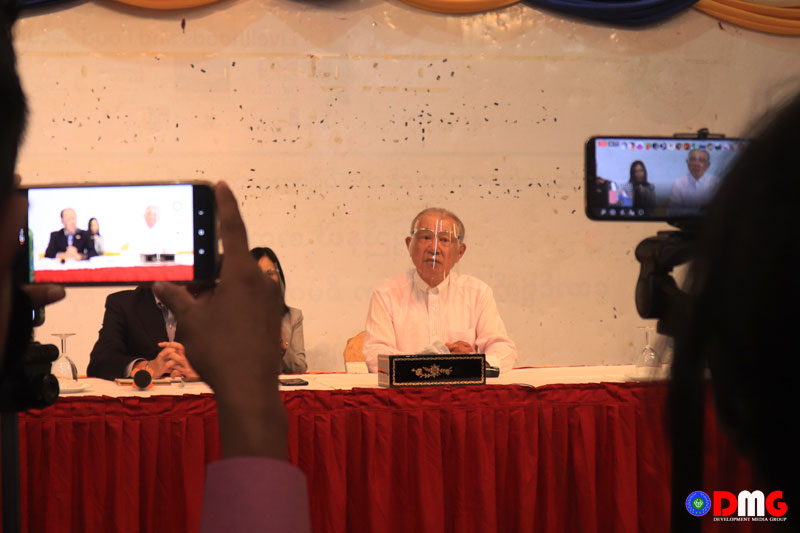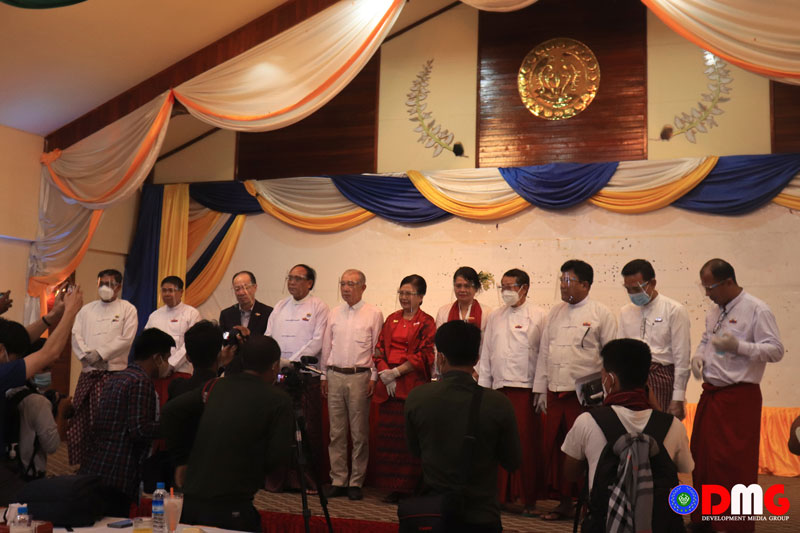- New Diplomatic Movements Between Bangladesh’s New Government and the Arakan Public Administration
- Junta claims over 24 million ballots cast in 2025 poll, cites strong youth turnout
- ULA expands HIV prevention, healthcare services for sex workers in AA-held areas
- Over 600 Mro villagers displaced in Maungdaw amid threats from ARSA, RSO
- Clashes continue in Sittwe as junta reinforces naval, armored deployment
Japan and Signs of Détente in Arakan State
Since a conflict in Arakan State that began in late 2018 has more recently subsided, both Myanmar’s military and the Arakan Army (AA) confirmed last month that there was a mediator in peace negotiations between the two sides. Not long after, the Japanese special envoy for national reconciliation in Myanmar arrived in Arakan State.
14 Dec 2020

By Min Htee | DMG
Since a conflict in Arakan State that began in late 2018 has more recently subsided, both Myanmar’s military and the Arakan Army (AA) confirmed last month that there was a mediator in peace negotiations between the two sides. Not long after, the Japanese special envoy for national reconciliation in Myanmar arrived in Arakan State.
Yohei Sasakawa came to observe whether or not conditions were favorable for holding elections in several northern Arakan State townships where voting in the November 8 general election was cancelled, purportedly for security reasons.
The special envoy visited Buthidaung and Kyauktaw townships, which have by some estimates experienced the largest number of clashes over the past two years. He also met representatives of the Arakan National Party (ANP), the strongest political party in Arakan State by several measures, in the state capital Sittwe.

His visit followed the Arakan Army publicly calling on Myanmar’s military and government to hold elections by year’s end in the constituencies affected by voting cancellations. Within hours of the AA statement being issued on November 12, the military responded by welcoming the ethnic armed group’s request.
The Union Election Commission (UEC) has not offered any official word on the possibility of holding make-up elections in Arakan State. The state election subcommission, however, has said it is ready to organise the voting.
Japan’s Sasakawa told the press in Sittwe that based on his observations, security conditions would allow for holding elections in the Arakan State townships that were passed over on November 8.
Arakanese politicians said the general election was not free and fair for Arakan State given that more than 1.2 million eligible voters lost their opportunity for representation due to the voting cancellations, which covered more than half of all seats in the state. Out of 64 elected seats in Arakan State, a total of 37 — eight seats in the national legislature’s Upper House, nine seats in the Lower House and 20 seats in the Arakan State Parliament — remain vacant.
Japan maintained bilateral ties with Myanmar while the latter was under military rule, and after Myanmar’s democratic transition began in 2010, Tokyo wrote off some of Myanmar’s debts. Japan has also provided financial aid annually. By supporting Myanmar in these ways, the Japanese government in part sees an opportunity to offset some of China’s influence over Naypyitaw, under military rule and in the transition period.
Myanmar’s internal conflict, which effectively began along with her independence in 1948, and the failure to realise the promises of the Panglong Agreement, have led to chronic civil war. Fighting on various fronts has lasted more than 70 years, absent a political solution based on federalism and equality. It is undeniable that ending the civil war and ensuring a lasting peace are the most important things for Myanmar’s future.
The National League for Democracy (NLD) has surpassed its 2015 voting results and won another resounding victory in the 2020 general election. However, that is not to say that the incumbent administration has been beyond reproach, with a particular set of grievances coming from ethnic states.
During the NLD’s almost completed five-year term from 2016-2021, critics in Arakan State and elsewhere say no significant reforms have taken place in Myanmar, and civil-military relations have not improved. They cite the government’s failure to make inroads in its relations with the Northern Alliance, a coalition of ethnic armed groups including the Arakan Army that have yet to sign the multilateral Nationwide Ceasefire Agreement (NCA).
Over the course of the NLD’s first term, the number of people internally displaced by the Tatmadaw-AA conflict rose to more than 230,000 last month. An even larger number of Muslims were pushed across the Arakan State border into Bangladesh in 2016-17, a matter for which Myanmar stands accused of genocide in a trial before the International Court of Justice (ICJ) that is ongoing.
The peace process has been further hindered by the limitations presented by the COVID-19 pandemic, but notably the same day that Myanmar announced its first coronavirus cases on March 23, the government and the military designated the Arakan Army as a terrorist group.
Things have looked relatively brighter more recently as the Tatmadaw and Arakan Army have begun what appears to be a substantive effort at détente. However, it’s too little too late for those pushing for the most inclusive elections feasible in Arakan State.
Sasakawa, the Japanese special envoy, sought to engage with the government and the Union Election Commission on prospects for holding make-up elections in the disenfranchised townships of Arakan State, but he reportedly had not received a reply as of early December. Much would seem to come down to what happens in the coming weeks, amid the current cessation of hostilities; whether this tentative ceasefire arrangement prevails in Arakan State, and whether there is UEC movement toward organising elections for the cancelled constituencies soonest. At this point, it seems almost certain that there will be no “make-up elections” before the end of the year.
Nonetheless, the government should use the détente to hold talks with the Arakan Army with the aim of rescinding the ethnic armed group’s terrorist designation. Now is a crucial chance for the NLD to showcase practical efforts in support of its statement on November 12, 2020, inviting the cooperation of 48 ethnic political parties in efforts to achieve their shared aims, including constitutional change and the formation of a democratic federal union.
The situation in Arakan State is admittedly very confused at the moment.
All things considered, the government should welcome a bilateral ceasefire based on negotiation between the Tatmadaw and the Arakan Army. Now is the best time for the NLD to intervene to strengthen trust between the two sides, fresh off its November election triumph and as the only political force in Myanmar that commands an electoral mandate. And yes, holding make-up elections as soon as possible in Arakan State would certainly further trust-building efforts.








.jpg)











